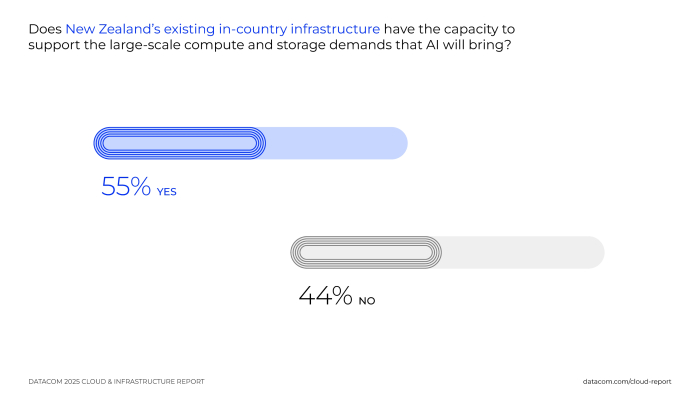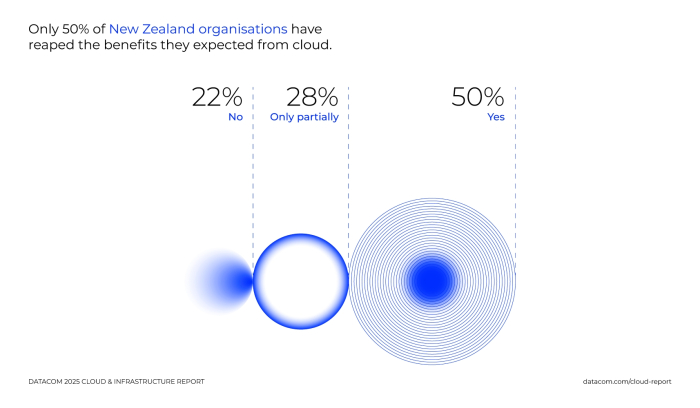New Zealand organisations have embraced cloud computing over the past decade, but many are now confronting a sobering reality: adoption alone isn’t enough. According to Datacom’s 2025 Cloud & Infrastructure Report, only half of New Zealand businesses say they’ve realised the benefits they expected from cloud – despite significant investment.
Mike Walls, Director of Cloud at Datacom, believes the issue lies not in the technology itself, but in how it’s being used.
“Many organisations are finding that cloud isn’t delivering the returns they expected, and a key reason for that is the ‘lift and shift’ approach, where legacy systems are moved with minimal modernisation. Without rethinking architecture and addressing integration complexities, the benefits of cloud are limited.”
Datacom’s sixth annual cloud report, based on a TRA survey of senior business leaders from more than 700 organisations, paints a picture of a cloud ecosystem at a crossroads. While agility, scalability and operational efficiency remain clear wins, many organisations are struggling with complexity, skills shortages and limited ROI.
Walls says the problem is cyclical.
“Every new technology promises benefits, but unless organisations evolve their people and processes alongside it, they won’t unlock full value.”
 Datacom Director of Cloud Mike Walls: Cloud is falling short for organisations because of the "lift and shift" approach, with minimal modernisation of legacy systems.
Datacom Director of Cloud Mike Walls: Cloud is falling short for organisations because of the "lift and shift" approach, with minimal modernisation of legacy systems. Global uncertainty a driver to rethink cloud strategy
Walls notes that geopolitical tensions, vendor lock-in risks and data sovereignty concerns are driving more organisations to rethink their infrastructure choices.
“Against the backdrop of increasingly complex and unpredictable global markets, more organisations are recognising the need to reassess cloud dependencies and to think about portability and resilience as part of their strategy.”
“Organisations should be looking to adopt a hybrid cloud strategy. You need the flexibility to run workloads across public and private environments, with the right architecture and security in place to protect your digital assets.”
Datacom’s report suggests containerisation is emerging as a key enabler. With 40% of New Zealand organisations either using or planning to adopt container platforms, Walls sees this as a pathway to greater flexibility.
“Containerisation helps reduce complexity and makes workloads more portable. It’s not a silver bullet, but it’s a step toward solving the hybrid cloud challenge.”
 Infrastructure
Infrastructure AI, sovereignty and data dilemma
AI is accelerating the need for cloud maturity, but it’s also exposing gaps in data governance and security. The report shows that 61% of New Zealand organisations are concerned about data sovereignty, and many are choosing to keep data processing in-country to mitigate risk.
Walls says this is about more than compliance, it’s about control.
“AI is a game-changer, but it relies on good data and good governance. If you don’t have strong governance, you risk losing control of your most valuable asset. That’s why we’re seeing a preference for private cloud when it comes to production AI workloads.”
He adds that hybrid strategies can help organisations balance innovation with protection.
“Use public cloud for experimentation and customer-facing services but keep core knowledge work and sensitive data in sovereign environments. And always back it up to immutable, sovereign storage.”
 Cloud Benefit
Cloud Benefit
Security strategy needs greater attention
Despite security being a top technology priority, only 43% of New Zealand organisations have a formal cloud security strategy. Walls believes this is a missed opportunity.
“Security and hybrid cloud strategies should be interconnected. Cloud-native security tools are incredibly powerful, but many organisations are still applying traditional methods that don’t fit the cloud model.”
He urges leaders to invest time in strategy, not just day-to-day operations.
“You need deliberate decisions that strengthen capability and deliver long-term value. That means aligning cloud, AI and security strategies from the outset.”
The report also highlights persistent challenges around budget constraints and skills shortages, issues that are particularly acute in New Zealand’s SME-heavy market.
Walls says this is where technology partners can play a vital role.
“You can’t do it all yourself. Partnering with organisations that understand your business and have locally available staff is key. It’s not just about deploying tech, it’s about enabling people and processes.”
For Datacom, that means leading by example. “We use a hybrid strategy ourselves, with sovereign AI models for sensitive data and public platforms for broader use.”
Cloud success ‘requires mindset shift’
Ultimately, Walls believes the path to cloud maturity lies in shifting the mindset, from technology adoption to business transformation.
“Cloud is a model, not a data centre. AI is a model, not just a tool. The real question is: what outcome are you trying to achieve? Design your technology around that and bring your people along for the journey.”
Download the full report here: datacom.com/cloudreport






